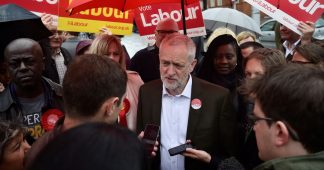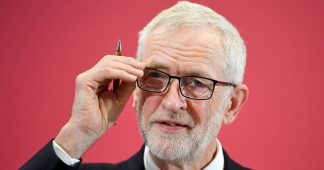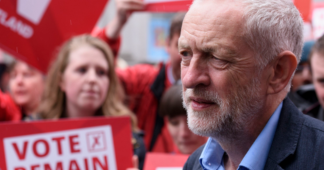By Neil Clark
25 Nov, 2019
Labour’s 2019 general election manifesto, ‘It’s Time for Real Change’, has left some supporters in tears, but the hard truth is that one electorally damaging policy on Brexit could scupper any chance of it being implemented.
It’s been called ‘A Manifesto of Hope’ and billed as the most radical programme for government put forward by an opposition party for decades. There are certainly some excellent policies contained in the document (particularly in relation to public ownership and lowering the cost of living), and one can understand why activists are so enthusiastic about it.
Unfortunately though, Labour’s commitment to hold a second Brexit referendum with Remain as one of the two options, means that the likeliest outcome is that the election campaign will end not in hope, but in despair for supporters of Jeremy Corbyn.
That’s because detailed academic research shows that the path to any Labour election victory lies through the party gaining pro-Leave Tory marginals in England and Wales – as well as holding on to pro-Leave seats it narrowly won in 2017.
The key stat is that 78 percent of Labour’s 45 target seats in England and Wales voted Leave in 2016, many of them quite strongly. “Winning these seats is a sine qua non for the formation of a Labour government.. If Labour cannot gain Conservative seats in England and Wales, then it cannot govern, even as a minority,” says Dr Richard Johnson, of Lancaster University.
Labour is banking that popular policies in their manifesto on bringing rail, water and the Royal Mail back into public ownership, maintaining free TV licenses for the over-75s and abolishing NHS hospital car parking charges, will persuade enough Labour Leavers not to desert the party for the Tories, or the Brexit Party – and also entice Tories to vote Labour. However, with under three weeks to go before the election and the party continuing to trail badly in the polls, it looks as if Labour has greatly underestimated just how important implementing Brexit is in its traditional heartlands in the North and Midlands. That miscalculation could be because Corbyn and many of the Shadow Cabinet have seats in London, where pro-Remain sentiments perhaps give a misleading impression of what the rest of the country is thinking.
The cost to the party of shifting to a more pro-Remain position could be great come election night. Whatever one’s views on the merits or demerits of Brexit, it doesn’t seem quite right that Remain should be given another chance to win, especially as Labour did promise to respect the result of the 2016 referendum. It all smacks of ‘you didn’t vote the right way three years ago, so please vote again’, something which Jeremy Corbyn himself criticised when it applied to Ireland and ratification of the Lisbon Treaty in 2009.
Labour’s ‘vote again’ policy could be described as the worst of both worlds. It alienates Leavers, but arguably doesn’t enthuse hardcore Remainers either, who would just like Article 50 to be swiftly revoked.
Furthermore, there is the issue of how continued EU membership would make other policies in the Labour manifesto difficult, or impossible, to implement. For instance, the policy of nationalising Openreach, a subsidiary of British Telecom and then providing free full-fibre- broadband through the company to every household in the country could fall foul of EU rules on state aid.
The basic flaw – and contradiction – in the Labour manifesto is this: the party makes a big thing of wanting to move towards a different economic model (‘Time for Real Change’), yet its referendum policy, which would put ‘Remain’ against a soft Brexit deal which would be unlikely to get strong Leave support, is clearly pro status-quo, geared as it is to ensuring that Britain stays in the privatisation-driving, neoliberal EU.
I’ve talked to a number of people who have said they‘re not going to vote Labour because they feel betrayed over Brexit – and labeling such voters as ‘scabs’ or ‘traitors’ as some have done – is certainly not going to help persuade them to return to the Labour fold on December 12. And, make no mistake, Labour needs them to return to the fold to have any chance of winning.
How different things might have been had Labour announced in October that they were going to support Prime Minister Boris Johnson’s Brexit deal, with suitable guarantees given over state aid and workers’ rights. If Labour had helped Johnson’s deal to get passed, then they would have gone into the subsequent general election in a much stronger position. Brexit would have been put to bed and the focus on the campaign would have been on those issues where the party clearly has the most popular policies, such as renationalising the railways and utilities and protecting pensioner benefits.
As it is, the election is being fought on Brexit, where Boris Johnson’s simple message of ‘Let’s just get the bally thing done’ resonates more than Corbyn’s ‘We’re going to have a second referendum and I’m going to stay neutral’. Labour don’t seem to have realised just how sick and tired people are of the whole wretched saga.
With still seventeen days to polling day all is not yet lost for Labour, but it’s no use pretending that the party hasn’t gone into the current election with a major handicap. To use a horse racing analogy, the Tories have been given a ten lengths start and a stone and a half weight concession because of their clearer stance on Brexit. Labour could still make up the lost distance, but one fears that the result of this particular race was already decided when the party opted to support a second referendum and because of that, everything else in their manifesto, however commendable, doesn’t really matter.
* Neil Clark is a journalist, writer, broadcaster and blogger. His award winning blog can be found at www.neilclark66.blogspot.com. He tweets on politics and world affairs @NeilClark66










